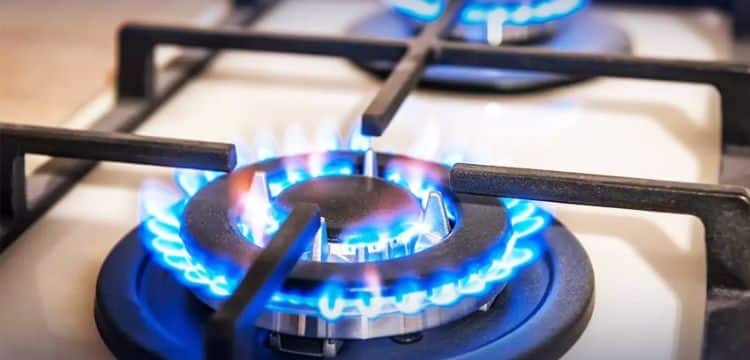[vc_row][vc_column][vc_column_text dp_text_size=”size-4″]
An emergency meeting of the Economic Coordination Committee (ECC) resulted in the approval of revised natural gas tariffs for both the Export and CNG sectors, as per an official press release from the Petroleum Division.
However, the Finance Division’s announcement of the ECC meeting for today (Tuesday) has caused confusion.
The Petroleum Division reports that during a Federal Cabinet meeting held on October 30, 2023, the ECC’s decision to reconsider the natural gas pricing was endorsed, subsequently leading to the approval of the new rates.
The press release states that the ECC has given the green light for a gas tariff of Rs. 2,400 per mmbtu for captive usage and Rs. 2,100 for the process export industry.
Previously, the ECC had sanctioned a gas tariff increase from Rs. 1,100 to Rs. 2,050 for both captive and process export industries based on the Petroleum Division’s recommendation.
Also Read: Consumers To Endure 16-Hour Gas Shortages In Winter
According to insiders at ProPakistani, the Energy and Commerce ministries had different positions on the matter. Caretaker Commerce Minister Gohar Ejaz advocated for reduced gas costs for exporters, while Caretaker Energy Minister Muhammad Ali sought to discontinue subsidies for exporters. The ECC ultimately decided to revise and enforce the new rates.
As for the non-export industry, the petroleum division initially proposed an increase from Rs. 1,200 to Rs. 2,600, but the ECC has now approved an increase to Rs. 2,500 from the initial Rs. 1,200 per mmbtu.
Additionally, the ECC has approved a gas tariff of Rs. 3,600 per mmbtu for the CNG sector, down from the earlier approval of Rs. 4,400 per mmbtu.
The Petroleum Division explains that the Federal Government aims to encourage the efficient use of natural gas, considering its scarcity, sustainability, and affordability. This approval, effective from November 1, 2023, is based on the advice of the OGRA.
The ECC had previously approved the increase in natural gas prices on October 23, 2023, as presented by the Petroleum Division.
The diminishing natural gas reserves, devaluation of the currency against the dollar, and general inflation have increased the costs associated with gas exploration, production, distribution, and transmission, leading to higher gas prices.
Past governments had maintained control over pricing this limited resource instead of strengthening regulatory oversight and internal controls for transparency and efficiency. Inadequate gas pricing and a lack of financing for imported gas diversion contributed to a circular debt stock of PKR 2.1 trillion (without interest).
Also Read: ECC Approves Up to 173% Gas Price Hike for Residential Consumers
Certain profitable businesses have been benefiting from cheap natural gas in the name of affordability, while low-income individuals, including poor farmers and small-scale industries, have been left deprived. The pricing decision has posed a significant challenge for the caretaker government, as it must balance affordability with the sustainability of the supply chain.
Under the IMF program, subsidies have been abolished, and the last price increase in January 2023 marked the first increase in two and a half years, resulting in an additional cost of PKR 461 billion in FY 22-23. Failure to implement price increases in line with OGRA’s advice and fund RLNG diversion to the domestic segment could lead to an additional circular debt of approximately PKR 400 billion.
The main objectives include ensuring sustainability of the supply chain, devising targeted affordability measures, and maximizing gas accessibility for efficient users. Only 30% of households in Pakistan use piped gas, with the rest relying on LPG, biomass, and other sources.
For protected consumers, where there is no gas price increase, a fixed bill of only Rs. 400 per month is being introduced, with a cap of Rs. 900 on consumption of 0.9 hm3 in a month.
Unprotected categories will see a progressive increase in tariffs for higher income households, ensuring that middle-income households are not unduly burdened. The government has kept gas prices unchanged for Roti tandoors due to their essential role.
Fertilizer prices will align with the cost of gas from the Mari gas field, with only a modest increase of Rs. 70 over the previous price to support farmers and food security.
Industry tariffs are designed to rationalize gas prices across regions and create a level playing field. The Petroleum Division has developed a Regionally Competitive Energy Tariff (RCET) in consultation with stakeholders to align with industry practices in neighboring countries.
The Petroleum Division aims to discourage captive usage by export and non-export customers by setting higher prices than for the process industry.
Efforts to conserve gas focus on sectors with inefficient use, where alternative fuels are available. More than 50% of commercial category consumers already use LNG, and over 27% of CNG connections are RLNG-based, with CNG costs nearly half that of petrol on an efficiency-adjusted basis.
[/vc_column_text][/vc_column][/vc_row]











